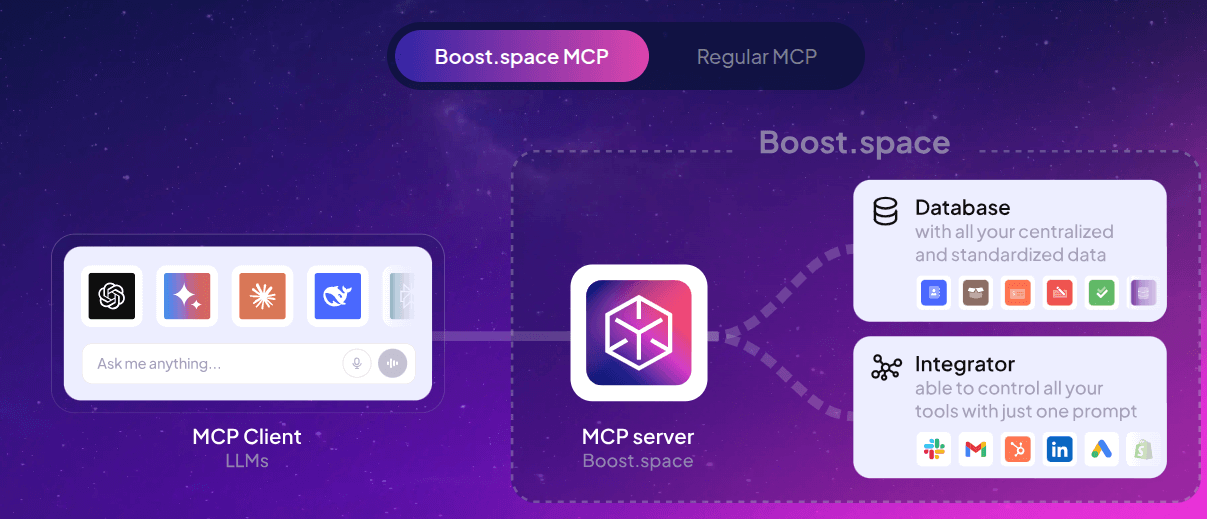In 2025, businesses face unprecedented complexity in data management, orchestration, and AI enablement. Legacy databases and fragmented data silos cannot support the demands of agentic automation and contextual, enterprise-scale intelligence. As organizations seek tangible ROI from AI, a new solution is required: the MCP Database, engineered as the cornerstone for persistent, AI-ready data integration.
Today’s enterprise faces data sprawl—across CRMs, operational tools, analytics platforms, and more. Traditional databases are limited: they organize data, but cannot maintain contextual, actionable memory across workflows, nor can they guarantee governed, secure access at enterprise scale. Gartner and Forrester note that over 57% of organizations admit their data is “not AI-ready”—making seamless automation and accurate decision-making elusive.
The stakes for getting data integration right have never been higher. With digital transformation accelerating, the gap between disconnected tools and unified, AI-powered environments is defining the next generation of market leaders. Companies anchored in legacy architectures are grappling with inconsistent data, duplicated effort, and slow responses to market demands. Meanwhile, the winners are those who can centralize and mobilize their information instantly—empowering every decision and AI-driven process with the right context at the right moment.
Stateless AI Agents: Most LLMs and automation scripts forget context, working only within a narrow conversation or session window. This digital amnesia forces AI agents to “start over” in every interaction, making them inefficient for complex enterprise tasks that require continuity and memory.
Siloed Applications: Disconnected data hinders automation, slows decision cycles, and introduces risk. When systems aren’t speaking the same language, valuable insights remain trapped in departmental silos, undermining collaboration and innovation.
Compliance Headaches: Legacy systems make it difficult to govern access, maintain audit trails, and comply with regulations. The lack of robust governance introduces vulnerabilities, risking non-compliance penalties while also slowing down digital initiatives due to manual controls and fragmented oversight.
These challenges are not theoretical—they actively hold back automation, customer experience, innovation, and even regulatory compliance for the majority of organizations.
The MCP Database is purpose-built for modern agentic automation. As the unified, governed memory layer behind Boost.space’s platform, it delivers:
Persistent Context: Stores historical, transactional, and operational data—always accessible to AI agents for continuity and learning. This ensures that every digital agent or workflow has the critical memory needed to drive complex, value-generating processes—without constant human supervision.
Unified Data Layer: Brings together all records, entities, and events from 2,399+ integrations into a single, queryable resource. This eliminates the need for data exports, manual merges, or risky third-party connectors that introduce security gaps and versioning conflicts.
Advanced Governance: Fine-grained access controls, full auditability, and compliance with GDPR, SOC 2, and ISO 27001. Enterprises gain peace of mind, knowing data flows are not only efficient but verifiably secure and compliant with even the most stringent industry requirements.
Real-Time Orchestration: Powers automations, dashboards, and analytics with consistent, always-current data. Whether it’s triggering personalized customer conversations or optimizing supply chain operations, the data infrastructure stays continuously in sync and ready for action.
By establishing a single, trusted source of truth, the MCP Database enables organizations to move beyond automation silos and truly orchestrate their business in real time.
Accelerated Automation: Enable agentic workflows that span departments, tools, and use cases—without manual intervention. Processes that used to take days or weeks across disconnected systems now unfold instantly and error-free.
AI-Driven Advantage: Give LLMs and digital agents persistent, actionable memory for smarter, safer automation. AI can track customer journeys, keep context across sales cycles, and adapt recommendations based on real business history, not just isolated queries.
Risk Reduction: Meet evolving security and compliance demands with an infrastructure built for enterprise trust. Automated logging, granular access control, and continuous monitoring make regulatory and board-level reporting proactive rather than reactive.
But most importantly, adopting a next-generation database like MCP places the business on the forefront of the agentic enterprise era. It becomes possible to experiment, iterate, and scale new AI-driven business models, confident that the underlying data is robust, current, and always governed.
Enterprises that adopt the MCP Database position themselves for operational excellence, not just today but for the AI-native future. Unified, governed, and context-rich data is now a source of competitive advantage—a prerequisite for innovation, agility, and resilient business growth.

